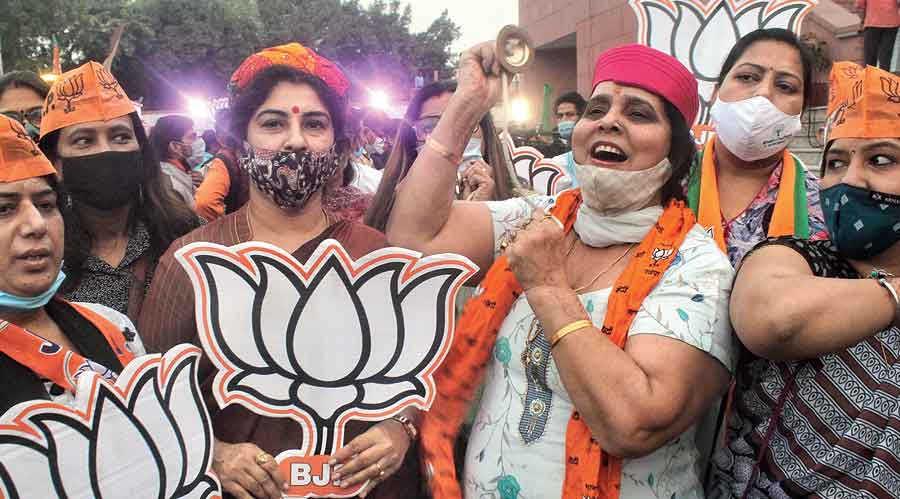The dream of the Congress for the emergence of a “moral voter” who would avenge the betrayal of their mandate in Madhya Pradesh lay shattered as the BJP swept the bypolls to 28 seats on Tuesday, ensuring that the Shivraj Singh Chouhan government completes the rest of its term.
The BJP’s dominance was manifested across the country; while it won six of the seven seats in Uttar Pradesh, it bagged all eight in Gujarat and two in Karnataka that went to polls. While the BJP dominated by winning four seats in Manipur, it wrested the sole seat in Telangana, stamping its nationwide ascendance.
It was only in Jharkhand where the ruling JMM and the Congress shared a seat each, apart from Chhattisgarh and Haryana where the Congress won the solitary seats going to polls.
Former chief minister Kamal Nath poured in all his resources and energies to claw back to power in Madhya Pradesh and even received impressive crowd responses during the campaign but the results didn’t reflect that kind of support. Jyotiraditya Scindia, who had led 25 Congress MLAs in defecting to the BJP, faced public anger during electioneering and there was a general perception that he would struggle to retain his base in his fiefdom of Gwalior-Chambal.
Congress leaders said they would have been happier winning more seats than the BJP in the bypolls even if they didn’t succeed in toppling the Shivraj government. While Kamal Nath said he accepts the people’s verdict with humility, many senior leaders expressed surprise at the outcome, insisting that the dominant sections of the society were angry at Scindia’s betrayal and believed that the defectors were driven solely by lust for power. Scindia, on the other hand, gained some legitimacy after the results.
While the outcome in Madhya Pradesh must have shaken the Congress, which expected to win at least 22 of the 28 seats, the ominous signals from Gujarat and Uttar Pradesh will leave the party leadership demoralised. While the difference in vote share in Gujarat between the BJP and the Congress is a whopping 20 per cent, the expectation that the party will significantly enhance its presence in Uttar Pradesh under Priyanka Gandhi Vadra’s leadership proved unreasonable.
The Congress was undoubtedly the most active party in Uttar Pradesh over the past 10 months, trying to reach out to the people in their miseries and struggle. But its vote share remained at the bottom of the table with merely 7.5 per cent while the BJP polled over 36 per cent, followed by the Samajwadi Party (23 per cent) and the Bahujan Samaj Party (19 per cent). There was speculation about the BSP’s political demise and the SP’s decline because of their inaction against the Yogi Adityanath government but the assessment of the Congress’s strength was obviously overestimated.
Priyanka will have to work harder if the Congress has to make inroads into frozen blocs of support in the state. While Uttar Pradesh will have Assembly elections in 2022, the Congress looks unprepared to pose any serious challenge to the dominant forces — the BJP and the SP.
In Gujarat, the Congress has squandered its gains of the last Assembly elections when the BJP had scraped through to form the government. The new younger leadership has neither been able to keep their flock together nor break fresh grounds despite creating a lot of noise.
The bypoll shock is bound to trigger discontent within the Congress and the demand for a full-fledged party president will intensify.
Although Rahul Gandhi has led from the front despite not being in command formally, the party’s performance in the bypolls to 54 constituencies and the Bihar Assembly elections will give credence to the questions raised by dissenters, known as Group of 23, who had written to Sonia Gandhi, complaining about the drift in the party after the defeat in the 2019 parliamentary elections.












